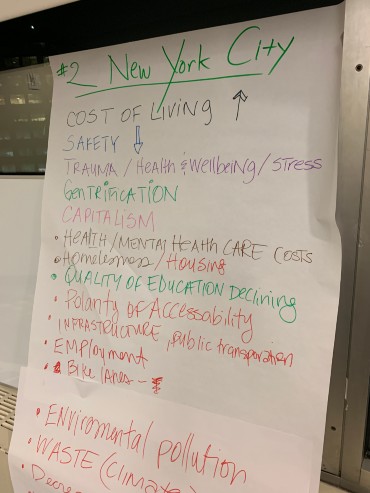By: Melanie Knuts
Incubator Participant
Adjunct Professor, Graduate School of Social Service

During our first Incubator meeting, I remember we were asked to “forget what we think we know.” Learning that the Incubator’s most daunting issues are Climate Control and Health, well, for me, this was a moment of “forgetting what I think I know.” I loved it!
Charles Montgomery’s book Happy City (first published in 2013) is a tour de force in neuroscience, psychology, economics, sociology, urban planning and architecture. In certain ways, this book defies description. And after my first reading of it, I felt (and continue to feel) it deserves to be a “bible” of sorts.
Searching for a passage that might be read at the beginning of our meeting, I rediscovered that while an easy read in many ways, Happy City is richly dense in a far-reaching range of knowledge, wisdom, analysis and specific current global solutions to our Incubator’s two “daunting issues.” Over the course of ten years and traversing back and forth between a dozen or so cities, Charles Montgomery methodically uncovers layers of what gives people their finest satisfactions in health and well-being—and the cities, with their specific designs, that foster these human experiences.
As an introduction to this work, I refer you to his examples in Bogota (pp. 230-239) where Montgomery makes this point: “These bollards show that the pedestrians are as important as people with cars. We are creating equality; we are creating respect for human dignity. We’re telling people, ‘You are important–not because you’re rich, but because you are human.’ If people are treated as special, as sacred, they behave that way. This creates a different kind of society. So every detail in a city must reflect that human beings are sacred. Every detail!” (pp. 236)
Tying it back to the Incubator, I understand that our “directive” is to uncover and understand the “daunting issues” that we face collectively—both in Higher Education and the wider global community. Once uncovered, our “mission” is to percolate and propose innovations that creatively address these issues within the Fordham community. Books like Happy City, and an assortment of resources and experiences that we can share together, offer ingenious existing solutions that can provide us with guideposts along the way of our adventure.
“Daunting issues” are just that, daunting because they may initially feel overwhelming, inspire fear and anticipatory discouragement. There is comfort, though, in knowing that we are together in a common endeavor. There is comfort in knowing that “two heads are better than one.” And, for me, there is great comfort in knowing that other wonderful people, compassionate thinkers who include their hearts in the choices they discern and the solutions they create-are traveling this path ahead of and alongside of us. I offer Happy City as one introduction to such people.
